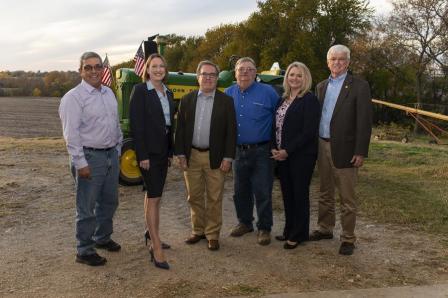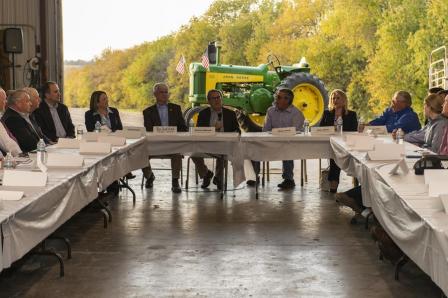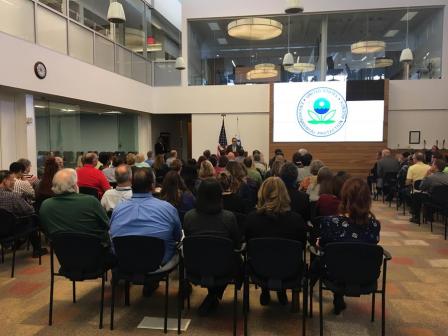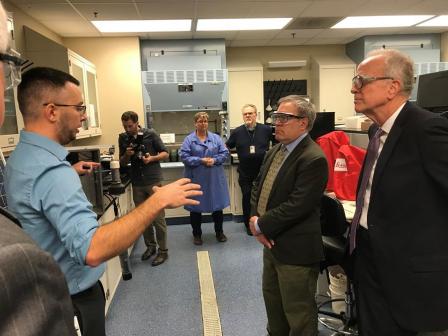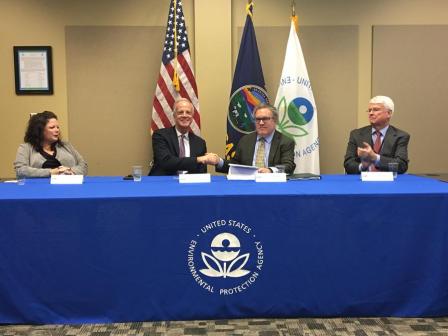News Releases from Headquarters›Office of the Administrator (AO)
Acting Administrator Wheeler Proposes an EPCRA Exemption for Livestock Emissions Reporting with Sen. Moran in Kansas
Acting Administrator Signs Proposed Rule While Wrapping Up Missouri and Kansas Visits
LENEXA — Today, U.S. Environmental Protection Agency (EPA) Acting Administrator Andrew Wheeler signed a proposed rule to amend the emergency release notification regulations under the Emergency Planning and Community Right-to-Know Act (EPCRA) to make clear that reporting of air emission from animal waste at farms is not required under EPCRA. He was joined by Kansas Senator Jerry Moran for the signing.
This proposed rule, if finalized, will provide livestock producers with greater regulatory certainty. It will also allow emergency response officials to focus on readiness and emergencies, not animal waste.
“This proposed rule is intended to make it clear to the regulated community that animal waste emissions from farms do not need to be reported under EPCRA,” said EPA Acting Administrator Andrew Wheeler. “This action provides much-needed certainty and clarity to America’s farmers and ranchers. It also ensures our emergency response officials are focusing their time and resources on hazardous waste emergencies and not routine animal waste.”
“Farmers and ranchers continue to face numerous challenges, and the removal of this unnecessary and burdensome regulation is welcome news for producers across our state,” said Senator Jerry Moran. “It was never the intent of Congress for normal odors from animal waste on farms to fall under our nation’s emergency hazardous waste reporting requirements, so I appreciate Administrator Wheeler taking definitive action today to provide certainty to the livestock industry. The resources of our emergency responders ought to be focused on protecting the public from true environmental and chemical emergencies, not odors from animal waste.”
“Our proposed rule would provide enhanced clarity for small and large animal producers and reduce confusion for emergency response officials throughout EPA Region 7, which covers the agricultural Midwest including Kansas, Iowa, Nebraska, and Missouri,” said EPA Region 7 Administrator Jim Gulliford.
“The goal of emergency response officials and local emergency planning committees (LEPCs) is to prepare communities for emergency threats. Such emergency threats certainly do not include 'best guess' reporting on day-to-day emissions on farms and animal operations,” said National Association of SARA Title III Program Officials (NASTTPO) President Tim Gablehouse. “These reports under EPCRA too often go ignored as they do not represent emergency situations to local communities. The focus of LEPCs should be and is on chemical hazards that present meaningful risk of harm to community members and first responders”
“The removal of this unnecessary burden will ensure that emergency first responders' important effort and time is not wasted on responding to non-emergencies. We look forward to working with local emergency planning commissions and emergency first responders to help them be familiar with how our poultry and egg facilities operate, so if there is a true emergency, their safety and efforts are enhanced,” said the U.S. Poultry & Egg Association, National Chicken Council and National Turkey Federation.
“NCBA appreciates Administrator Wheeler’s effort to provide regulatory relief to America’s cattle producers. We are happy to see the EPA follow through on the commitment to conduct a rule making on EPCRA and will reiterate our call for common-sense. NCBA encourages its members to build relationships with their local first responders. Unlike the submission of needless paperwork, talking to responders about potential on-farm hazards can save lives. NCBA looks forward to submitting comments on the proposed rule,” said National Cattlemen's Beef Association (NCBA) President Kevin Kester.
The signing comes on the heels of a roundtable hosted yesterday by the Missouri Farm Bureau with impacted stakeholders that would benefit from the proposed rule. The roundtable included Missouri Department of Agriculture Director Chris Chinn, Missouri Department of Natural Resources Director Carol Comer, U.S. Department of Agriculture (USDA), agricultural leaders, and animal producers to discuss important issues including the EPCRA exemption and the Agency’s proposal to repeal and replace of the 2015 “Waters of the United States” (WOTUS) rule.
Today while in Kansas, Administrator Wheeler held an all-hands meeting with EPA's employees, met with union leadership in EPA’s Region 7 office, and toured EPA’s Region 7 Lab with Senator Moran.
While at the lab, Administrator Wheeler signed the proposed EPCRA exemption and was joined by Senator Moran, Kansas Department of Agriculture Secretary Jackie McClaskey, NASTTPO President Tim Gablehouse, USDA, Kansas Farm Bureau, Kansas Livestock Association, Nebraska Farm Bureau, Nebraska Cattlemen, Livestock Marketing Association, and National Pork Producers Council.
Background
In May 2017, the D.C. Circuit court vacated EPA’s 2008 regulatory exemption for livestock reporting under EPCRA. Following that court action, the Trump EPA issued guidance stating reporting still does not need to occur from livestock producers based on EPA’s interpretation of EPCRA.
Today’s proposal requests comment on the Agency’s interpretation that these types of releases are not subject to EPCRA reporting. If finalized, this proposal would maintain consistency between the emergency release notification requirements of EPCRA and CERCLA in accordance with the statutory text and framework of EPCRA.
You can read the proposed rule here: https://www.epa.gov/sites/production/files/2018-10/documents/proposed_epcra_amendment_signed_10-30-18.pdf
For more information, please see our web page at www.epa.gov/animalwaste

